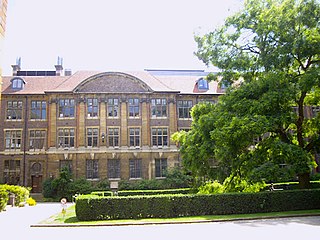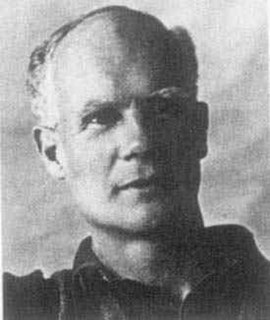Related Research Articles

The Cavendish Laboratory is the Department of Physics at the University of Cambridge, and is part of the School of Physical Sciences. The laboratory was opened in 1874 on the New Museums Site as a laboratory for experimental physics and is named after the British chemist and physicist Henry Cavendish. The laboratory has had a huge influence on research in the disciplines of physics and biology.

Sir Thomas Little Heath was a British civil servant, mathematician, classical scholar, historian of ancient Greek mathematics, translator, and mountaineer. He was educated at Clifton College. Heath translated works of Euclid of Alexandria, Apollonius of Perga, Aristarchus of Samos, and Archimedes of Syracuse into English.

Alexander Robertus Todd, Baron Todd was a Scottish biochemist whose research on the structure and synthesis of nucleotides, nucleosides, and nucleotide coenzymes gained him the Nobel Prize for Chemistry.

The Department of Plant Sciences is a department of the University of Cambridge that conducts research and teaching in plant sciences.

The Royal Society of Edinburgh is Scotland's national academy of science and letters. It is a registered charity, operating on a wholly independent and non-party-political basis and providing public benefit throughout Scotland. It was established in 1783. As of 2017, it has more than 1,660 Fellows.

The Royal Asiatic Society of Great Britain and Ireland, commonly known as the Royal Asiatic Society (RAS), was established, according to its royal charter of 11 August 1824, to further "the investigation of subjects connected with and for the encouragement of science, literature and the arts in relation to Asia." From its incorporation the society has been a forum, through lectures, its journal, and other publications, for scholarship relating to Asian culture and society of the highest level. It is the United Kingdom's senior learned society in the field of Asian studies. Fellows of the society are elected regularly. Fellows include highly accomplished and notable scholars of Asian studies. They use the post-nominal letters FRAS.

Egon Sharpe Pearson was one of three children and, like his father Karl Pearson, a leading British statistician.

Marjory Stephenson, MBE, FRS was a British biochemist. In 1945, she was one of the first two women elected a Fellow of the Royal Society.

Sir Bernard Walter Silverman, is a British statistician and Anglican clergyman. He was Master of St Peter's College, Oxford from 1 October 2003 to 31 December 2009. He is a member of the Statistics Department at Oxford University, and is also attached to the Wellcome Trust Centre for Human Genetics, the Smith School of Enterprise and the Environment, and the Oxford-Man Institute of Quantitative Finance. He has been a member of the Council of Oxford University and of the Council of the Royal Society. He was briefly President of the Royal Statistical Society in January 2010, a position from which he stood down upon announcement of his appointment as Chief Scientific Advisor to the Home Office. He was awarded a Knighthood in the 2018 New Years Honours List, "For public service and services to Science".

Thomas Edward Allibone, CBE, FRS was an English physicist. His work included important research into particle physics, X-rays, high voltage equipment, and electron microscopes.
Walter Mackersie Smith (1842-1906) was a Scottish engineer who made an important contribution to the development of the compound steam locomotive. His middle name has sometimes been mis-spelt Mackenzie. He was born at Ferry-Port on Craig, Fife.
Sir Samuel Crowe Curran, FRS, FRSE DL LLD, was a physicist and the first Principal and Vice-Chancellor of the University of Strathclyde – the first of the new technical universities in Britain. He is the inventor of the scintillation counter, the proportional counter, and the proximity fuze. Colleagues generally referred to him simply as Sam Curran and latterly just as Sir Sam. To date, Curran remains the longest serving Principal and Vice Chancellor of the University of Strathclyde, holding the post for 16 years, not counting his previous 5 years as Principal of the Royal College of Science and Technology.

John "Jack" Guthrie Tait V.D. was a Scottish educator who became principal of the Central College of Bangalore prior to the First World War. In his early adulthood, Tait was a notable sportsman playing rugby union as a forward for Cambridge University and represented the Scotland international team twice between 1880 and 1885. As well as being a talented rugby player, Tait was, like his brother Frederick Guthrie Tait, a notable amateur golfer.
Sir Sydney Castle Roberts was a British author, publisher and university administrator. He was a well-known and popular figure around Cambridge throughout his life, and was recognised as a publisher of skill and distinction.

Norman Neill Greenwood FRS CChem FRSC was an Australian-British chemist and Emeritus Professor at the University of Leeds. Together with Alan Earnshaw, he wrote the textbook Chemistry of the Elements, first published in 1984.
Colonel Alfred Edward Webb-Johnson, 1st Baron Webb-Johnson, known as Sir Alfred Webb-Johnson, Bt, between 1945 and 1948, was a British surgeon.
References
- 1 2 3 Thomas, J. S. G. (1949). "Samuel Walter Johnson Smith. 1871-1948". Obituary Notices of Fellows of the Royal Society . 6 (18): 578–598. doi:10.1098/rsbm.1949.0014. JSTOR 768941. S2CID 178185513.
- ↑ "Smith, Samuel Walter Johnson (SMT890SW)". A Cambridge Alumni Database. University of Cambridge.
| This article about a physicist is a stub. You can help Wikipedia by expanding it. |